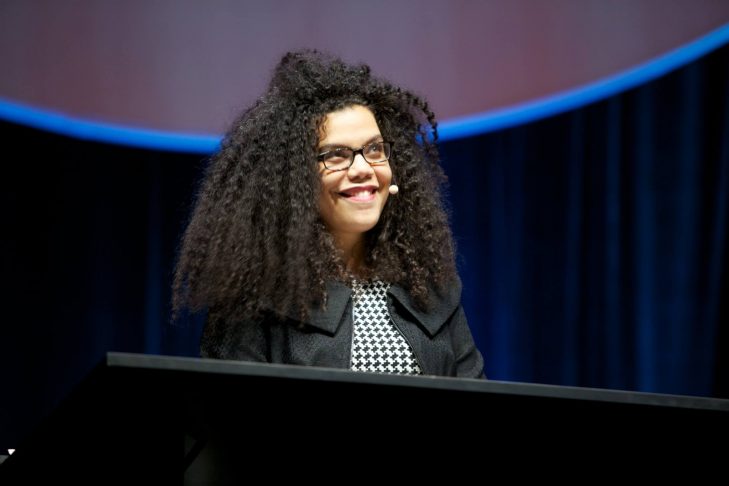April Baskin is the future of Reform Judaism. The 34-year-old holds a job title at the Union for Reform Judaism (URJ) that is as bold and creative as she is. Baskin is the union’s first vice president for “audacious hospitality.” She’s held the position since the spring of 2015. A Jew of color, her message of inclusion is meant for all of the constituencies within and currently outside the movement.
In a recent interview with JewishBoston during the Reform movement’s 74th Biennial, which took place in Boston last week, Baskin recalled anticipating her job description at the 2013 Biennial. “My position was described in Rabbi Rick Jacobs’ 2013 Biennial speech,” she said. “I started to cry when he called on all of us in the Reform movement to do some deep reflection about having more people outside of our movement than in. He said we will be better for including interfaith families, LGBTQ people, Jews of color, people with disabilities, Gen-X people, Boomers and others. At that point, I had been doing this kind of work for over a decade, but had not seen or heard a leader of Rabbi Jacobs’ stature so clearly and in such a beautiful way say we want to bring people into our movement.”
Baskin grew up in the Sacramento, Calif., area in a Reform Jewish congregation, where she thrived in both Hebrew school and the movement’s youth group—National Federation of Temple Youth (NFTY). “I was that rare kid who loved Hebrew school,” she said. “My parents initially sent me to a NFTY event as punishment, but I loved it! It was like camp. I loved the issues. I loved expressing my opinions. It was the best punishment ever!”
She moved up in NFTY ranks to become the regional social action vice president. That was in her senior year of high school—a year also marked by family trauma. Visiting family in New Jersey, her mother was hit by a drunk driver on the way back to her hotel. She suffered a broken cervical spine at the same time her father was already bedridden from chemotherapy treatments. Baskin was attending a magnet high school 30 miles from her home. “Our synagogue saved my family,” she said, choking back tears. “They pulled together a whole food delivery system and a carpool schedule. The leaders in my synagogue had values and reached out to us as any family [in the congregation]. My synagogue embodied ‘audacious hospitality’ before the notion was formally conceived.”
Baskin shared her riveting Jewish story during Kabbalat Shabbat (Friday evening) services on the Biennial’s main stage. And as she and I were speaking the next day at a table along one of the hallways of Hynes Convention Center, we were repeatedly interrupted by people who wanted to tell her how moved they were by her speech. Many of them asked for hugs and told her they loved her. “I love you, too,” Baskin said again and again, clearly emotional from the outpouring of affection.
Before Baskin moved to New York to be URJ’s vice president of audacious hospitality, she had put down roots in Boston. A graduate of Tufts University, she wrote her thesis on the experiences and identities of young Jews of color in American Judaism. “One of my takeaways from interviews was that Jews of color are perpetual strangers in Jewish life,” she said. “I heard so many stories of marginalization, where they were confused as the hired help or even intruders. We unknowingly treat these people as strangers because of class, age or race.”
Baskin was also president of the Jewish Multiracial Network while working full-time at the World Justice Project. She eventually landed at the Newton-based InterfaithFamily (IFF) as director of resources and training. “I used my organizing background to work with Jewish institutions to better equip them and their leaders to engage people from interfaith families and homes,” she said. During her time at IFF, Baskin was also one of CJP’s Chai in the Hub honorees in 2015.
And then URJ came calling. “I was happily ensconced at IFF when I was recruited by URJ,” she said. “It felt like God and the universe together were calling my bluff by saying, ‘Here’s what you want; now roll up your sleeves.’” Baskin has done more than roll up her sleeves at URJ. She is passionate about her work and about the possibilities that audacious hospitality offers her fellow Jews. She asserted that if “you’re interested in participating and exploring Judaism, we’re interested in doing that with you. We have a biblical and metaphoric Abrahamic tent, and all our tent flaps are open. We’re also working to push out the tent poles further to make more room both literally and figuratively.” For Baskin, this entails an out-of-the-box strategy for “how we adapt so that our programs, our community, our movement is tailored for this moment in both Jewish history and broader world history.”
To fulfill the movement’s vision of inclusion, Baskin emphasized, “The heart of audacious hospitality is that we will be a stronger, more vibrant Jewish community when we not only welcome but also embrace and incorporate diversity in all of its hues. That is the reality and the future of modern Jewish life.”





